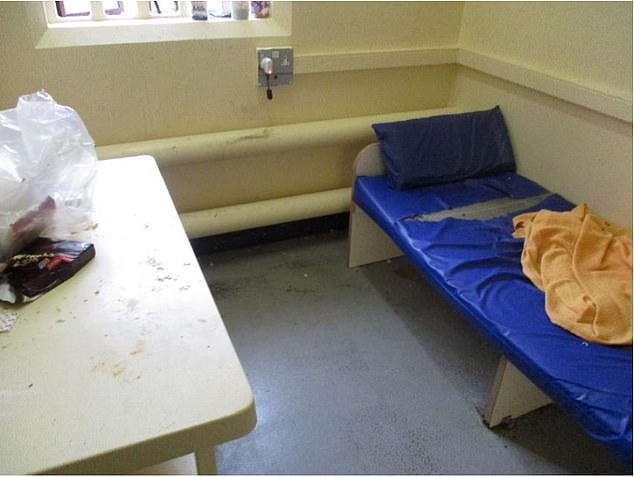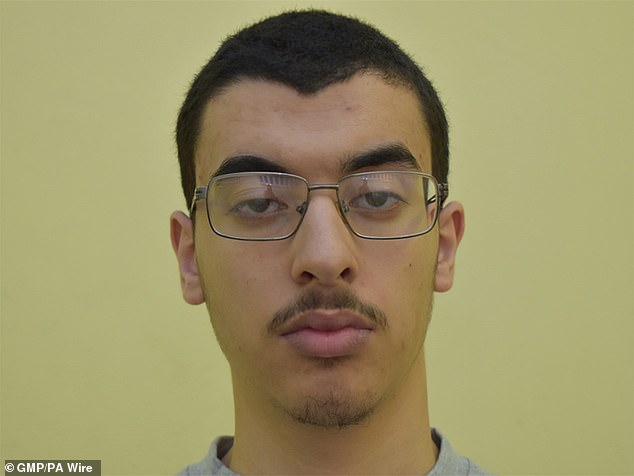Locked in a cell behind a see-through, reinforced Perspex door, Axel Rudakubana’s every move was watched around the clock.
For months following his sentencing in January, a rota of prison officers at HMP Belmarsh followed the same daily routine, standing guard or seated in a chair, eyes always on the 18-year-old.
Given the nature of his crimes – Rudakubana stabbed three young girls to death at a Taylor Swift-themed dance class in Southport – keeping him safe was always going to be a challenge.
Because alongside paedophiles, child killers are regarded as the lowest of the low by fellow inmates.
And in a Category A prison such as Belmarsh, those already serving lengthy sentences have little to lose from meting out ‘prison justice’.
‘Welcome to Hell-Marsh,’ reads the graffiti scrawled on the door of a reception cell into which incoming prisoners are first brought, a nod to the roll-call of infamous names who have been held within its walls, including serial killer Levi Bellfield, black-cab rapist John Worboys, Fusilier Lee Rigby’s killers and Great Train Robber Ronnie Biggs.
But when Rudakubana arrived at Belmarsh, the first priority for those running the jail in south east London wasn’t keeping him safe from others – but from himself.

Axel Rudakubana is serving a 52-year sentence for stabbing to death three young girls at a Taylor Swift-themed dance class in Southport
Because of his age, the state of his mental health and the 52-year sentence he was given, the teenager was assessed as being at an acute and immediate risk of suicide and self-harm.
It meant that he was placed in a cell in the jail’s healthcare centre, an area of the prison that includes cells designed to allow staff to better monitor inmates. Ian Huntley, the Soham schoolgirls’ murderer, is among those previously detained there.
Rudakubana was placed under ‘constant watch’ in what is referred to as a ‘gated’ single cell with a see-through plastic door – meaning there would not have been a minute of the day when he was not being directly observed by a prison officer.
‘Officers would sit on a chair a foot or so from the cell and just watch Rudakubana,’ a source told The Mail on Sunday.
‘It was pretty boring but also very demanding on staff numbers and there was a lot of overtime available.’ But several weeks ago it is claimed that prison authorities scaled back observations and the overtime ‘offers’ stopped.
‘It’s obvious now that Rudakubana had been taken off 24-hour watch as they deemed him less of a risk,’ the source said.
The decision to reduce his supervision would have been taken after advice from health staff and a psychiatrist. But prison officers who dealt with him would also have had input. None is understood to have picked up any signs of impending trouble.
‘He was withdrawn, avoided communication and mainly slept,’ a source with knowledge of Rudakubana said. ‘There was no evidence he was planning a violent attack. It came out of the blue.’

Police and the prison authorities at at HMP Belmarsh, a Category A men’s prison located in Thamesmead, south-east London, are investigating and trying to understand what motivated Rudakubana to launch the attack guards
Another added: ‘There was no intelligence about his behaviour to suggest he was a threat apart from being very withdrawn.’
While fixtures within the cell itself such as the bed, toilet and window are designed with a view to reducing the risk of self-harm – for example, a concrete bed and stainless steel toilet – Rudakubana still had access to a kettle for hot drinks. It was this he chose to use as a weapon ten days ago, hurling scalding water through the hatch in the cell door at a male officer.
While it was initially feared Rudakubana had mixed the water with sugar to cause more severe burns and scarring, what’s known as ‘prison napalm’, thankfully that wasn’t the case.
Miraculously, the injured officer escaped severe injuries and after treatment at the nearby Queen Elizabeth Hospital in Woolwich was discharged the same day. ‘Other officers heard him screaming and the commotion,’ another insider said of the incident.
‘One of the first things they did was put cold water on him. They also restrained Rudakubana and made sure he could not do anything worse to the guard.’
Police and the prison authorities are investigating and trying to understand what motivated Rudakubana to launch the attack.
‘We desperately need to know what triggered it,’ one insider said. ‘Was it done out of a jihadist mindset – does he represent a constant, violent threat? Or, was it a one-off, a petulant outburst?’
Although Rudakubana was identified as a risk three times by the Prevent counter-terrorism programme and police officers discovered ricin pulp and a copy of an

Child-killer Axel Rudakubana had been under constant guard in a cell like this one
Al Qaeda manual at his house, no clear ideological reason for his Southport attack was found so it was not classified as terrorism. Another source added: ‘He is clearly a very disturbed individual but he was pretty well behaved up until the incident when he threw hot water at a prison officer.
‘Was he planning this for a while or did he just do it in the moment – it’s possible we’ll never know.’
But one expert suggested that as well as understanding Rudakubana’s motivation, the mindset of prison managers needs to change as they have become too focused on whether prisoners are a danger to themselves, rather than others, putting staff at risk as a result.
Former prison governor Professor Ian Acheson last night told this newspaper: ‘It seems on this occasion staff were distracted by his vulnerability as opposed to his danger to officers.
‘This is a blindspot in high-risk management that means managers are placing the rights of prisoners over the rights of prison officers to go home safe after a shift. That balance needs to be restored before we have a fatality on our hands.’

Some 10,605 assaults on staff in male and female jails were recorded in 2024, up from 9,204 in 2023 and nearly three times the 3,640 in 2014
The Mail on Sunday understands that Rudakubana is likely to remain at Belmarsh while police investigate the incident. It is thought he is still on the healthcare unit but that security around him has been stepped up.
He will now only be allowed out of his cell to shower and exercise, and will be moved around the prison by a five-officer escort in full protective equipment, with dogs also potentially used.
The incident has once again raised questions as to whether highly dangerous prisoners are being treated too leniently.
Some 10,605 assaults on staff in male and female jails were recorded in 2024, up from 9,204 in 2023 and nearly three times the 3,640 in 2014.
It was only a month ago that three prison guards at HMP Frankland, another high-security jail, were hospitalised by Hashem Abedi.
The 28-year-old is serving a 55-year sentence for assisting his brother’s suicide bomb attack on Manchester Arena which killed 22 people, many of them children.
The Islamist, who already had form for attacking a guard while himself held at Belmarsh, threw hot cooking oil over the officers before stabbing them with homemade weapons. Despite being held in the Co Durham jail’s Separation Centre – a prison within a prison designed to prevent inmates who have refused attempts to deradicalise from spreading their toxic message to other inmates – Abedi had access to a kitchen.
It was there he is understood to have fashioned two 8-inch blades from baking trays, as well as heating a pan of oil which he threw at the officers.
One male officer was then stabbed in the neck, with the blade coming close to severing an artery. Another male officer was stabbed at least five times in the back, puncturing a lung. A female colleague was also injured.
Abedi’s attack sparked an outcry, with politicians calling for the ‘appeasement’ of jailed terrorists to stop and for him and those like him to be held in total isolation.
Following Rudakubana’s attack, Shadow Justice Secretary Robert Jenrick repeated that ‘get-tough’ call while warning that a prison officer will be killed if the Government does not deal with ‘spiralling’ violence by prisoners.
Last week it emerged that a prison guard had also been attacked at HMP Woodhill in Milton Keynes, having his throat slashed by an inmate using an improvised weapon. Calling for kettles to be taken from the cells of all high-risk prisoners, Mr Jenrick told the Commons: ‘I couldn’t care less if Rudakubana never had a hot drink again, nor would the British public.
‘This culture of appeasement, of protecting the rights of convicted terrorists and criminals over the safety of our officers must end, and it must end now.
‘If that means keeping them in cells with just a bed, so be it.
‘If it means no contact, no privileges and certainly no cups of tea, so be it. Let segregation truly and finally mean segregation.’
It is a move endorsed by Prof Acheson, who said: ‘Axel Rudakubana was convicted of a carefully premeditated and horrific attack of extreme violence.
‘He won’t leave prison alive and has demonstrated a history of non-compliance.
‘These traits should have made him an exceptional risk to officers particularly in view of the alleged attack on staff a few days earlier at HMP Frankland by someone who shared the same characteristics, Hashem Abedi.’
According to reformed prisoner Ricky Killeen, who spent four years in HMP Frankland having been jailed for his involvement in a machete attack, Rudakubana’s assault of the prison officer will inevitably make his time inside much harder.
‘He is in prison for killing three little, innocent angels and he is now attacking the screws [prison officers] who are the only ones who are there to protect him,’ said Mr Killeen, who now dedicates his time to assisting other ex-inmates to rebuild their lives, and running a YouTube channel called Behind The Bars TV.
‘He is on the top of the list for prisoners to act out “prison justice” on and the only protection he has got is from the screws on the block.’
He added: ‘He has done everyone a favour because 99.9 per cent of people want him to suffer for what he has done.
‘His time now is going to be 100 times harder. Now the screws won’t have to be nicey, nicey to him. He is now going to be living in the harshest conditions ever.
‘He will have no privileges, he will not have anything in his pad [cell] that he can use as a weapon, he will be kept in solitary.
‘He might get out for exercise, for 15 minutes if he is lucky every couple of days and he won’t be getting his daily showers so he will be in his pad, stinking, in silence.’
Mr Killeen believes it is not a question of ‘if’ Rudakubana is attacked by another prisoner so much as ‘when’. ‘It is only a matter of time,’ he says. ‘He will be viewed as the worst of the worst. Roy Whiting has been attacked a number of times and it is going to be exactly the same for him.’

Last month, Hashem Abedi attacked three prison guards at HMP Frankland. The 28-year-old is serving a 55-year sentence for assisting his brother’s suicide bomb attack on Manchester Arena which killed 22 people
Whiting snatched eight-year-old Sarah Payne from a country lane near her grandparents’ home where she had been playing with her siblings in West Sussex, in July 2000. Since being jailed for life for her murder, he has been slashed, knifed, clubbed and beaten on at least five occasions.
Meanwhile, Soham murderer Huntley was attacked while on the healthcare wing at HMP Frankland. His throat was slashed by a prisoner using a razor-blade that he had melted into the handle of a plastic knife. His attacker, who had a deep-seated hatred of child killers, told a prison officer: ‘Is he dead? I hope so.’ But Huntley, who needed 21 stitches to his neck, survived.
Following the incident involving Rudakubana, a Prison Service spokesman said: ‘Police are investigating an attack on a prison officer at HMP Belmarsh.
‘Violence in prison will not be tolerated and we will always push for the strongest possible punishment for attacks on our staff.’
But Mark Fairhurst, chairman of the Prison Officers’ Association, says more needs to be done and is calling for the introduction of facilities equivalent to ‘supermax’ regimes in the US.
‘We would give them basic entitlements and that is their lot, they are not getting anything else,’ he says. ‘They go nowhere else in the prison and they are banged up for 23 hours a day and there is nothing in their cell that can be used to attack staff. The time has come for control and containment.’
For the growing number of prison officers across the country nursing serious injuries, and only alive thanks to good fortune, it is a change of approach that cannot come soon enough.












